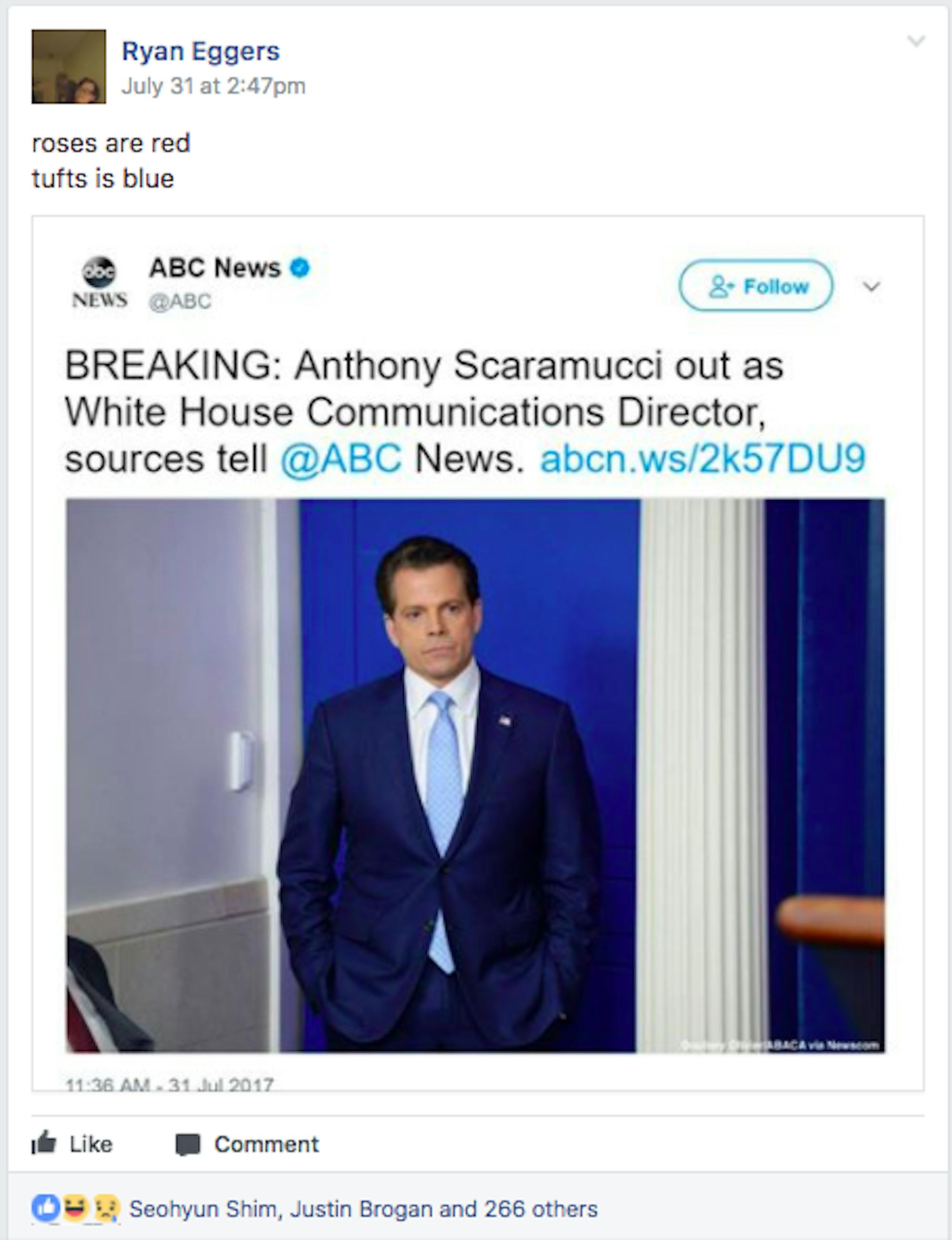Disclaimer: Peter Lam is a graphics editor and former executive graphics editor for the Daily. He was not involved in the writing of this article.
During a conversation at late night dining in Carmichael Dining Center last spring semester, sophomores Leo Mandani, Mary K. Kelley and Peter Lam created Tufts Memes for Quirky Queens, a Facebook page dedicated to memes about life at Tufts.
“We were talking about the [University of California], Berkeley memes page ['UC Berkeley Memes for Edgy Teens'] and decided we should make our own," Kelley said. "We didn’t realize how much it would blow up.”
According to Kelley, the three founders each added some friends and thought that the page would be funny for a couple of days and then die down. However, the page picked up momentum quickly.
“We reached 1,000 members within the first 24 hours of making the page,” Kelley said.
Subsequently, they added a few more moderators to deal with the growth of the page, says Kelley. The page currently has five admins and five moderators. It hosts over 7,100 members, surpassing the Tufts undergraduate population of 5,508 (as of Fall 2016).
Tufts Memes for Quirky Queens has posts commenting on controversial topics such as socio-economic status, rising tuition and Greek life. Timely memes appeared on the page related to the short-lived tenure of former White House Communications Director Anthony Scaramucci. Additionally, the page hosts multiple memes focusing on stereotypes of majors and the Jumbos community.
“The memes that get a lot of likes are major [related] because they encapsulate the commonalities between all students on campus, and not just a niche group,” Mandani said.
Mandani said that memes which garner over 1,000 likes and those that spark conversation are momentous events on the memes page. Kelley pointed to the change of the name of the page to "Brown Reject Memes for Broke AF Teens" on April Fools' Day as a big event in the history of the page.
Mandani explained that the moderators and admins also scroll through the page and delete any memes or posts that they deem "offensive or inappropriate."
In the June 12 article entitled "Statistical Means for Tufts Memes," posted on Tufts' Independent Data Journal, Tufts Enigma, a survey sent out by the authors of the article found that while 32% of respondents have ever been offended by the content on the memes page, 60% of the respondents believed that the page should be moderated.
The article noted that after the passage of the pro-BDS resolution by the TCU Senate, many pro-Israel and pro-Palestine posts appeared on the page. The admins, regardless of the position of the person posting, deleted all posts related to this issue. According to Kelley and Mandani, they decided that this was not the correct forum for that specific discussion.
“The ones that are controversial or spark up debates, on one hand, they are used as opportunities for people to educate others on issues that are usually swept under the rug," Mandani said. "But on the other hand, they result in a division on campus especially during times of intense polarity.”
Jesse Littlewood, a former lecturer at Tufts and current adjunct lecturer at the Harvard Kennedy School of Government, provided some insight on the two-sided coin of memes.
While the page is humorous and full of relatable content, its memes hold connotations that people can have trouble dissecting, according to Littlewood.
He explained that some of the best memes have an element of anonymity.
“While in the context of a small liberal arts college on a Facebook page it is hard to be anonymous, there is still a degree of separation,” Littlewood said. “Some of our worst instincts come out when anonymity is involved — vindictiveness, homophobia, racism, anti-semitism..."
Littlewood explained that, in general, people feed off controversial posts. The Tufts Enigma article shows that some of the top posters said they make memes for reasons including: "validation," "external validation," "to make people laugh" and "attention."
However, Littlewood pointed out that it's useful for people in a community to be aware that others in the community that hold these prejudiced and negative views exist. He provided the example of the "free speech" rally that occurred onBoston Common on Aug. 19 and the counter-protesters who spoke out against a group of white supremacists.
“On the other side of the coin, creativity can be unlocked and unleashed, and you get some fascinating, useful, bizarre and funny creations that come out of [memes and other anonymous creations on the internet],” Littlewood said.
Littlewood pointed out that sometimes it can be difficult to separate the two sides of the coin from one other. Although the balance of hateful speech and creativity are not always equivalent in each case, untwining the two can be quite difficult.
Another important aspect of the memes page that Littlewood mentioned is its use as a place for people to communicate and connect, especially for people with different interests and backgrounds.
“The internet can provide a space for people of marginalized backgrounds to show up without others judging them based on their gender, race, socioeconomic status, etc.,” Littlewood said.
On the other hand, Littlewood noted that people need to be aware of their level of privilege when walking into a conversation online.
“You want people to fully express themselves in a conversation, but, I, for example, someone with white, male privilege can go offline and all that privilege comes with me,” he said.
While people "meme" for a myriad of reasons and from a range of perspectives, Mandani hopes that the Tufts Memes for Quirky Queens page stays true to its intended purpose.
“In the end, the page was created with the intent of it being an outlet for people, and we plan on keeping it that way,” Mandani said.
Tufts memes page navigates students' opinions

Facebook





